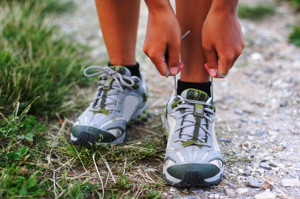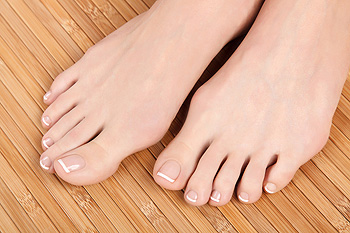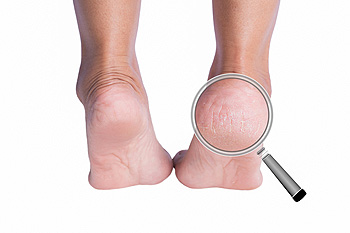
 Research has shown the feet may change sizes as the aging process occurs. Many people may select shoes by the size that is indicated, despite the fact they may not fit properly. It’s important to try both shoes on, which may aid in determining if these are the correct shoes to purchase. Adequate space up to a half inch above the longest toe should be present for maximum comfort while standing up. It’s important to consider the material of the shoe, which may consist of a soft and flexible consistency that ideally should match the shape of the foot. Many people try shoes on that may fit too tightly, and their expectation may be that the shoes will stretch over time. This is considered to an erroneous method of buying shoes and a properly fitted shoe will feel good at the time it is tried on. If you would like additional information on how to buy shoes that fit properly, please consult with a podiatrist who can properly guide you.
Research has shown the feet may change sizes as the aging process occurs. Many people may select shoes by the size that is indicated, despite the fact they may not fit properly. It’s important to try both shoes on, which may aid in determining if these are the correct shoes to purchase. Adequate space up to a half inch above the longest toe should be present for maximum comfort while standing up. It’s important to consider the material of the shoe, which may consist of a soft and flexible consistency that ideally should match the shape of the foot. Many people try shoes on that may fit too tightly, and their expectation may be that the shoes will stretch over time. This is considered to an erroneous method of buying shoes and a properly fitted shoe will feel good at the time it is tried on. If you would like additional information on how to buy shoes that fit properly, please consult with a podiatrist who can properly guide you.
Getting the right shoe size is an important part of proper foot health. Seek the assistance of Dr. Edward D. Hutson from Easton, PA. . Our doctor will provide the care you need to keep you pain-free and on your feet.
Getting the Right Shoe Size
There are many people who wear shoes that are the incorrect size, negatively affecting their feet and posture. Selecting the right shoes is not a difficult process, so long as you keep several things in mind when it comes to choosing the right pair.
As our feet hold our body weight and keep us moving, it is important to treat them right. Picking the right pair of shoes can provide your feet comfort and mobility without pain.
If you have any questions, please feel free to contact our offices located in Easton, and Northampton, PA . We offer the newest diagnostic and treatment technologies for all your foot care needs.
 When the sugar levels in the blood become elevated, the medical condition that is known as diabetes may occur. The feet may become affected as a result of this, and proper care must be given, which may avoid uncomfortable and painful foot ailments. These may include diabetic neuropathy, which may make it difficult to feel any wounds or cuts that may be present, or peripheral vascular disease, which may limit blood flow to the feet. Research has shown that foot conditions that are associated with diabetes will benefit from effective treatment methods when implemented. These may include properly taking care of wounds or infections that may have developed, in addition to possibly wearing a boot, which may relieve pressure off the foot. If you are a diabetic patient, it is suggested that you consult with a podiatrist as quickly as possible who can properly monitor this condition, which may affect the feet.
When the sugar levels in the blood become elevated, the medical condition that is known as diabetes may occur. The feet may become affected as a result of this, and proper care must be given, which may avoid uncomfortable and painful foot ailments. These may include diabetic neuropathy, which may make it difficult to feel any wounds or cuts that may be present, or peripheral vascular disease, which may limit blood flow to the feet. Research has shown that foot conditions that are associated with diabetes will benefit from effective treatment methods when implemented. These may include properly taking care of wounds or infections that may have developed, in addition to possibly wearing a boot, which may relieve pressure off the foot. If you are a diabetic patient, it is suggested that you consult with a podiatrist as quickly as possible who can properly monitor this condition, which may affect the feet.
Diabetic foot care is important in preventing foot ailments such as ulcers. If you are suffering from diabetes or have any other concerns about your feet, contact Dr. Edward D. Hutson from Easton, PA. . Our doctor can provide the care you need to keep you pain-free and on your feet.
Diabetic Foot Care
Diabetes affects millions of people every year. The condition can damage blood vessels in many parts of the body, especially the feet. Because of this, taking care of your feet is essential if you have diabetes, and having a podiatrist help monitor your foot health is highly recommended.
The Importance of Caring for Your Feet
Patients with diabetes should have their doctor monitor their blood levels, as blood sugar levels play such a huge role in diabetic care. Monitoring these levels on a regular basis is highly advised.
It is always best to inform your healthcare professional of any concerns you may have regarding your feet, especially for diabetic patients. Early treatment and routine foot examinations are keys to maintaining proper health, especially because severe complications can arise if proper treatment is not applied.
If you have any questions please feel free to contact our offices located in Easton, and Northampton, PA . We offer the newest diagnostic and treatment technologies for all your foot and ankle needs.
Read more about Diabetic Foot Care If you suffer from cracked heels, you may be familiar with the pain and discomfort that is often associated with this condition. There are several reasons linked to developing cracked heels, including a loss of moisture in the skin as the aging process occurs, and medical conditions that may include thyroid issues and vitamin deficiencies. Additionally, people who are obese may suffer from this condition and this may be a result of the excess weight the heels must endure. Research has shown the importance of wearing shoes that offer maximum support in the heel area, which may diminish the possibility of developing this painful condition. There may be measures that can be implemented to prevent this ailment from occurring, which may include washing and drying the feet thoroughly, followed by utilizing a good moisturizing cream. If you have cracked heels, it is suggested to speak to a podiatrist to discuss additional treatment options.
If you suffer from cracked heels, you may be familiar with the pain and discomfort that is often associated with this condition. There are several reasons linked to developing cracked heels, including a loss of moisture in the skin as the aging process occurs, and medical conditions that may include thyroid issues and vitamin deficiencies. Additionally, people who are obese may suffer from this condition and this may be a result of the excess weight the heels must endure. Research has shown the importance of wearing shoes that offer maximum support in the heel area, which may diminish the possibility of developing this painful condition. There may be measures that can be implemented to prevent this ailment from occurring, which may include washing and drying the feet thoroughly, followed by utilizing a good moisturizing cream. If you have cracked heels, it is suggested to speak to a podiatrist to discuss additional treatment options.
Cracked heels are unsightly and can cause further damage to your shoes and feet. If you have any concerns, contact Dr. Edward D. Hutson from Easton, PA. . Our doctor can provide the care you need to keep you pain-free and on your feet.
Cracked Heels
Cracked heels appear unappealing and can make it harder for you walk around in sandals. Aside from looking unpleasant, cracked heels can also tear stockings, socks, and wear out your shoes. There are several methods to help restore a cracked heel and prevent further damage.
How Do You Get Them?
Dry skin is the number one culprit in creating cracked heels. Many athletes, walkers, joggers, and even swimmers suffer from cracked heels. Age and skin oil production play a role to getting cracked heels as well.
Promote Healing
Over the counter medicines can help, especially for those that need instant relief or who suffer from chronic dry feet.
Wear Socks – Wearing socks with medicated creams helps lock in moisture.
Moisturizers – Applying both day and night will help alleviate dryness which causes cracking.
Pumice Stones – These exfoliate and remove dead skin, which allows for smoother moisturizer application and better absorption into the skin.
Change in Diet
Eating healthy with a well-balanced diet will give the skin a fresh and radiant look. Your body responds to the kinds of food you ingest. Omega-3 fatty acids and zinc supplements can also revitalize skin tissue.
Most importantly, seek professional help if unsure how to proceed in treating cracked heels. A podiatrist will help you with any questions or information needed.
If you have any questions, please feel free to contact our offices located in Easton, and Northampton, PA . We offer the newest diagnostic and treatment technologies for all your foot care needs.
Read more about Solutions for Cracked Heels If you are noticing that your middle toes are bent downward, you may have developed a condition that is referred to as hammertoe. It is generally caused by wearing shoes that have little support in addition to having inadequate room for the toes to move about in. These shoes may cause the muscles and tendons in the toes to become weak and may be unable to aid in straightening the toes. If shoes that are worn fit properly and are comfortable, hammertoe development may be preventable. Research has shown that despite wearing the proper footwear, there may be genetic reasons why this ailment may occur. These may include being born with the second toe that is longer than the big toe or having specific medical conditions that may encompass arthritis or diabetes. If you notice that hammertoe is beginning to develop, it is suggested to consult with podiatrist as quickly as possible to begin the correct course of treatment.
If you are noticing that your middle toes are bent downward, you may have developed a condition that is referred to as hammertoe. It is generally caused by wearing shoes that have little support in addition to having inadequate room for the toes to move about in. These shoes may cause the muscles and tendons in the toes to become weak and may be unable to aid in straightening the toes. If shoes that are worn fit properly and are comfortable, hammertoe development may be preventable. Research has shown that despite wearing the proper footwear, there may be genetic reasons why this ailment may occur. These may include being born with the second toe that is longer than the big toe or having specific medical conditions that may encompass arthritis or diabetes. If you notice that hammertoe is beginning to develop, it is suggested to consult with podiatrist as quickly as possible to begin the correct course of treatment.
Hammertoe
Hammertoes can be a painful condition to live with. For more information, contact Dr. Edward D. Hutson from Easton, PA. . Our doctor will answer any of your foot- and ankle-related questions.
Hammertoe is a foot deformity that affects the joints of the second, third, fourth, or fifth toes of your feet. It is a painful foot condition in which these toes curl and arch up, which can often lead to pain when wearing footwear.
Symptoms
Causes
Genetics – People who are genetically predisposed to hammertoe are often more susceptible
Arthritis – Because arthritis affects the joints in your toes, further deformities stemming from arthritis can occur
Trauma – Direct trauma to the toes could potentially lead to hammertoe
Ill-fitting shoes – Undue pressure on the front of the toes from ill-fitting shoes can potentially lead to the development of hammertoe
Treatment
Orthotics – Custom made inserts can be used to help relieve pressure placed on the toes and therefore relieve some of the pain associated with it
Medications – Oral medications such as anti-inflammatories or NSAIDs could be used to treat the pain and inflammation hammertoes causes. Injections of corticosteroids are also sometimes used
Surgery – In more severe cases where the hammertoes have become more rigid, foot surgery is a potential option
If you have any questions please contact our offices located in Easton, and Northampton, PA . We offer the newest diagnostic and treatment technologies for all your foot and ankle needs.